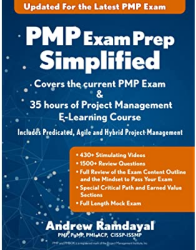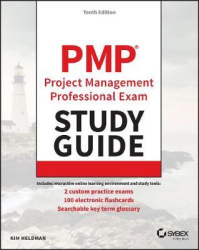- PMP Exam Prep Simplified
- Head First PMP, 4th Edition
- The PMP Exam: How to Pass on Your First Try 6th Edition Plus Agile
- PMP Project Management Professional Exam Study Guide, 10th Edition
- Rita Mulcahy’s PMP Exam Prep, 10th Edition Upgraded
project-management.com is able to offer our services for free because some vendors may pay us for web traffic or other sales opportunities. Our mission is to help technology buyers make better purchasing decisions, so we provide you with information for all vendors — even those that don’t pay us.
Core Features << FEATURES >> Integrations << INTEGRATIONS >>What is the PMP Exam?
The PMI’s Project Management Professional certification indicates the individual is knowledgeable and adept in project management concepts and skills. The PMP exam is a vital part of earning that certification. It contains 180 questions with five pre-tests (unscored) questions randomly placed throughout the examination. A test taker needs to complete the exam within an allotted time of 230 minutes with two 10-minute breaks.
The latest PMP examination content outline or ECO (introduced in January 2021) divides the questions into three domains: People (42%), Process (50%), and Business Environment (8%). Half of the examination questions represent predictive project management approaches, and the other half represent agile or hybrid approaches. Further, these approach-related questions related to approaches are now found throughout these three domain areas and are not isolated to any specific domain or task.
Best PMP Exam Prep Books
Here is a list of the best PMP exam prep books PMP candidates can use to prepare for the exam and also as a quick reference guide. These include updated information about predictive, agile, and hybrid approaches.
PMP Exam Prep Simplified
Author: Andrew Ramdayal
Andrew Ramdayal, PMP, is a project manager with over 15 years experience in IT, having worked on numerous IT projects over his career. He holds other professional certifications in IT and accounting, including a Master’s degree in management information systems with a minor in project management.
The latest edition of Ramdayal’s PMP exam prep book has been updated for the latest 2021 PMP exam with sections for predictive, agile, and hybrid project management and video-based content on the PMBOK Guide: Seventh Edition. Its 478 pages cover each process and knowledge area, key PM terms, and a whole chapter discussion on the new exam content outline.
This PMP prep book also includes questions and answers for each chapter, ethics, exam tips, and a full-length mock exam. It also includes free access to video courses that earn the viewer an equivalent of 35 hours of PDU to fulfill the exam requirement.

Pros
- Testimonials of first-time takers who passed
- Comprehensive content that matches exam questions
- Comes with mock exams and access to free digital content
Cons
- Incorrect page numbers and grammatical errors
- Some users feel it does not have enough agile content
Head First PMP, 4th Edition

Authors: Jennifer Greene, Andrew Stellman Jennifer Greene, PMP, and Andrew Stellman, PMP, are software engineers and O’Reilly authors who have worked as project managers and academic researchers. In 2003, they founded Stellman and Greene Consulting, which provides software development services and training to companies and individuals. The fourth edition of this PMP book is ready for the 2021 PMP exam format. Its 924 pages cover the process framework and all other knowledge areas tested in the exam. It also has a chapter on the rationale for getting certified, the importance of professional responsibility, a final review, and a practice exam. What is unique about this PMP book is its unique visual format that makes the learning more memorable and effective. The pages have a dynamic layout where no two pages are the same to help keep the reader engaged. Its attention-grabbing graphics and a healthy mix of text and images are designed to call out new learning material and other important information. Pros
- Easy to read with an engaging page layout
- Adequate practice questions
- Testimonials from readers who passed the PMP exams
Cons
- Some readers feel that the agile sections need improvement
- Needs more types of questions that reflect the latest PMP exam content outline
The PMP Exam: How to Pass on Your First Try, 6th Edition Plus Agile

Author: Andy Crowe Andy Crowe, PMP, authored several books on project management. He is the founder and CEO of Velociteach, a provider of project management training and exam prep coaching. The latest edition of PMP Exam: How to Pass on Your First Try, Plus Agile includes updates that cover the 2021 exam changes. It includes coverage of predictive, agile, and hybrid approaches, as well as discussions of project management processes, inputs, tools, and outputs, The 840-page book includes details about the exam itself, foundational concepts, processes, and knowledge areas. It also provides a limited access trial to Velociteach’s learning, test tips and tricks, links to online videos that explain concepts, and access to hundreds of practice exams. Pros
- Testimonials from users who passed on their first try
- Good organization of material
- Intuitive and easy to read
Cons
- Some users feel that the agile content is still lacking
- Most questions are on the practical side, less on the conceptual side
PMP Project Management Professional Exam Study Guide, 10th Edition

Author: Kim Heldman Kim Heldman, PMP, is the CIO of the Regional Transportation District in Denver, CO. She directs and oversees multi-million, multi-year projects. She is a project manager with over 25 years of experience in IT project management and has authored several books and articles. The 10th Edition of this PMP book has been updated for the 2021 PMP exam. It is a comprehensive resource to help PMP aspirants prepare for the exam and succeed on the job as a confident project manager. Its 912 pages are divided into 12 chapters covering the foundations of project management, key knowledge areas, and PMOs. This PMP study guide show users how to develop project plans, schedules, and budgets, engage stakeholders, identify risks, procure resources, and develop the team, among others. It also has a preliminary assessment test, end-of-chapter questions, and access to online learning tools. Pros
- Coverage of agile and other iterative processes
- Detailed discussion of chapter objectives
- Practice exams and electronic flashcards
- Does not include the latest PM principles and performance domains
- An instance of wrong use of a formula
Rita Mulcahy’s PMP Exam Prep, 10th Edition Upgraded

Editor: Patti Frazee Rita Mulcahy was an author, public speaker, founder of RMC, and internationally recognized expert in PM techniques, theory, and PMP exam preparation. After Mulcahy’s death in 2010, RMC Project Management continues to edit and update the book, which is now in its 10th edition. RMC’s PMP Exam Prep book has been updated with the current ECO to reflect the current changes made by the PMI. The 537-page volume is described as “a project management course in a book.” It includes tricks for passing the exams and identifying gaps in the reader’s knowledge. The PMP exam preparation book now includes additional content on agile, project process, integrations, communication, and stakeholders to help prepare students for the exam. It also has exercises, practice questions, proven study techniques, and a license to an online PMP exam simulator. Pros
- Comprehensive content
- Time-saving study tips
- Free access to an online PMP exam simulator
Cons
- Presence of typo errors
- Complex graphics
Latest PMP Exam and the 7th Edition PMBOK Guide
It is important to note that the current PMP exam includes questions that reflect the critical tasks of project leaders based on experience and resources. Elements in Edition 7 of the PMBOK Guide may be included in the latest exam, but the questions are not bound by the seventh edition, so the sixth edition is still relevant to the latest exam. However, as a PMP, professionals should be able to manage any type of project, whether traditional, predictive, agile, or hybrid. Read also: CAPM vs PMP: Which is the Best Certification For You? Back to top
PMP Certification
PMP certification is ideal for professionals who at least have three years of experience and some formal project management education. They are automatically qualified for the PMP certification exam. Receiving this certification proves expertise in several project management methods as well as a validation of leadership and people management skills. The new PMP exam focuses on three domains that enable the project professional to work smarter. Receiving the certification demonstrates several things. First, certified professionals possess the soft skills to effectively lead a project team. Second, they have technical process know-how to successfully manage projects. Third, their PMP certification also means they are aware of the important connection between projects and the organization, so they can help company executives align project and business goals. For the project professional, a PMI certification from the official project management body also gives them a competitive edge in terms of a higher salary, opportunities for promotion, and continuing high demand for the profession for years to come. The best PMP book, together with other learning modes and test prep activities, such as taking an e-learning course from Master of Project Academy, reviewing sample questions, answering a practice question, or going for a longer practice test, can help project professionals achieve their goals. Read next: When Is It Worth It to Get a PMP Certification?